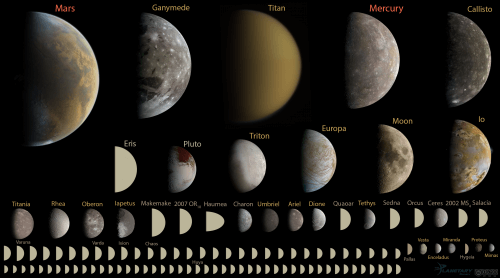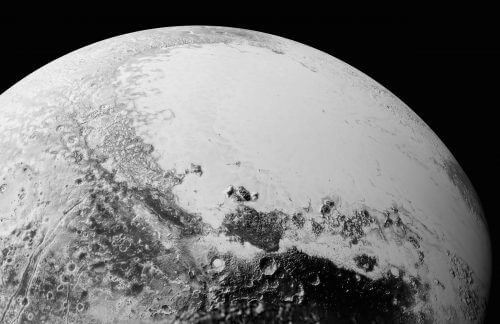Researchers from the New Horizons mission, which studied the dwarf planet Pluto, recently published an article in which they call for a new definition of planets, more than a decade after the decision of the International Astronomical Union, which "took" from Pluto its planet title. But the new proposal, according to which every gram of sky with enough mass to take on a spherical shape would be considered a planet, would increase the number of planets in the solar system to at least 110. Even the moon would be considered a planet under the proposal. So why do they want to reopen a debate that seems to have been decided long ago?

On January 16, 2006, when the New Horizons spacecraft Shugara For space, her mission was to explore the last unexplored planet in the solar system - Pluto. But just a few months after its launch, Pluto was removed from the family of planets, following the decision of the International Astronomical Union (IAU), in which for the first time an official definition was given for the term "planet", which was separated from a new definition given for Pluto and other bodies similar to it - "dwarf planet".
It was a controversial decision, which reduced the number of planets in the solar system to eight, after decades in which Pluto was considered the ninth planet of the solar system, since its discovery in 1930. It is intended to put an end to the debate regarding the definition of Pluto as a planet, which began at the end of the last century and intensified in the early 2000s, following the discovery of new bodies the size of Pluto in the same region at the edge of the solar system, known as the Kuiper Belt. Objects like Eris, which is almost the same size as Pluto, showed that the dwarf planet is not unique in this region of the solar system.
The 2006 IAU decision established three criteria for defining a celestial body as a planet: 1) the body orbits the Sun. 2) The body has enough gravity to take a spherical shape. 3) The body cleared its path from other bodies.
The decision stated that bodies that meet only the first two criteria, but have not cleared their orbit from other bodies, such as Pluto, will receive a new and separate definition of "dwarf planet".
Although the debate seemed to be settled, there are still researchers who insist on restoring Pluto to its greatness: a group of researchers Recently published an article In it they call for a new definition of the concept of a planet, which will take into account only its geophysical characteristics and not external characteristics such as its location and the nature of its orbit. The researchers will present their proposal inLunar and Planetary Science Conference” Your hair next March.
It's no surprise that those researchers are all members of the New Horizons mission, which arrived at Pluto in July 2015 and sent us spectacular images of that icy, tiny, distant world. Among the researchers is Alan Stern, the mission's principal investigator.
The definition they offer is formulated as follows: "A planet is a body with a mass less than that of a star, which has never undergone a process of nuclear fusion and which has enough self-gravitational force to assume a spheroidal shape, which is sufficiently described as a triaxial ellipsoid, regardless of to its orbital characteristics". A simpler version of the proposal, according to the researchers, is "round bodies in space that are smaller than stars".
But what is actually the problem with the current definition of the IAU? According to the researchers, there are several deficiencies in the definition of planets based on their external characteristics and their orbital position, although it is worth noting that some of their arguments were already raised during the original debate more than a decade ago.
The researchers claim in their article that the criterion of removing other bodies from the planet's orbit is inaccurate, because there are many small bodies in the solar system that are in the planets' orbits - for example, there are many asteroids that cross the Earth's orbit.
On top of that, they note that the greater the planet's distance from the Sun, the more space it has to "clean up". According to them, even the Earth, at the great distance where Pluto is from the Sun, will not be able to completely remove other bodies from its orbit. Thus, the new definition creates, according to them, a problematic requirement that a planet be larger and more massive, the further it is from the Sun.
The researchers also point out that the definition of planets as those that only orbit the Sun excludes extrasolar planets, which are in orbit around other stars, or rogue planets that are not in orbit around any star at all.

If the proposal is accepted, it will not only return Pluto to its old status, but it will mean that at least 110 bodies in the solar system will receive the prestigious title of "planet". Since any body with a spherical shape is included in the definition proposed by the researchers, moons could also be considered planets - including our moon.
The sheer number of planets included in the new definition doesn't deter the paper's lead author, Kirby Runyon, a doctoral student at Johns Hopkins University and a member of the New Horizons imaging team. In an interview with the website Universe Today, he said: "Fifty countries is a lot to memorize, 88 constellations is a lot to memorize. How many stars are there in the sky? Why do we need a number that can be remembered? How does it take part in the definition? If you understand that the periodic table is organized based on the number of protons, you don't need to remember all the atomic elements. There is no logic in the definition of the IAU when they spread the argument that there are too many planets in the solar system."
The proposal does not seek to stop the use of the term "dwarf planet", but to make it a subcategory in a broader category of planets, similar to how there is a subcategory for gas giants (Jupiter and Saturn), ice giants (Uranus and Neptune), and terrestrial planets (Mars, Earth, Venus and Mercury). Moons that meet the criterion of a mass sufficient to obtain a round shape will also be considered "moon planets".
But what motivates the researchers precisely now, ten years after the debate was decided, to try and reopen it? The main reason seems to be the public interest in the study of Pluto and bodies like it, which the researchers claim has decreased following the IAU decision. According to them, there were even those who asked why NASA sent a research spacecraft to Pluto, if it is no longer a planet.
The researchers hope that a broader definition of planets will arouse wider public interest in the study of bodies in the solar system, which, among other things, will encourage decision makers to continue funding research missions to those worlds.
Will the researchers submit the proposal for a vote in the International Astronomical Organization? probably not. In an interview with Universe Today, Kirby challenged the IAU's authority to rule on the issue. When asked if he would submit the proposal for a vote at the organization's conference, Kirby replied: "No. Because the IAU is assumed to have ownership of the definition. We in the planetary science field do not need the IAU's definition. The definition of words is based in part on how they are used. If [our definition] is what people use and what teachers teach, it will become the de facto definition, regardless of what the IAU votes in Prague."
It does not seem that the new proposal will be able to change the mind of the other side and the winner (at least so far) in the debate. Michael Brown, the astronomer whose work played a very important part in the decision to remove Pluto from the family of planets, and who calls himself on his Twitter account "Pluto killer", was not convinced at all. Brown discovered many bodies in the Kuiper belt, including the dwarf planets Eris, Sedna and Maka-Maka, whose discoveries reinforced the understanding that Pluto is not special in this region on the edge of the solar system.
Brown, who these days is trying to find "Planet Nine", whose existence chest together with another researcher about a year ago, said In an interview with The Register website: "I am sorry that this small but noisy group continues to confuse the public and make them think that there is no essential difference between the real planets and the countless tiny bodies like Pluto. Pluto - like other bodies in our solar system - is a tiny and fascinating world, but that doesn't mean we should bury our heads in the sand and ignore its proper place in the hierarchy of the solar system, just to make ourselves feel better."

5 תגובות
2000 years the moon was already a planet.
Yehuda
I think your idea is excellent. Scientifically it really doesn't matter, but culturally it matters.
Why not add only Pluto to the list of planets as a representative of all the dwarf planets?
Thus, we leave the existing definition of planets, and give the "respect" it deserves to Pluto as the first among the dwarfs.
Just a suggestion and therefore: please respond gently.
Yehuda
Bored people, instead of engaging in science engage in semantics.
This and the basis of it can never be decided because it is a human classification in which it will always be
An object that is found on the threshold neither here nor here looking at the galaxy and the amount of planets where it is clear that there is a transition that is analog-linear between the classification modes and not digital
Another place we are familiar with is the definition of life, for example, what is the border between inanimate and living, for example, is a virus a living being?
The decision of the International Astronomical Union is ultimately absurd
Let's take for example claim number 3: the body cleared its orbit from other bodies, this is a strange claim because at the beginning of the existence of the solar system the planets both Jupiter and Saturn probably moved from their initial position and the time it takes to clear space is several million years so according to the claim they were planets first then They were not planets for the millions of years of evacuation until some certain moment (the degree of evacuation) that it too can be subject to vikoh and then 'Tadam!' It's back to being a planet, plus it's likely that other solar systems have moons the size of the Earth that move around a giant planet that's in the golden zone around the Sun that allows water to exist and has an ocean of water on it, all the makings of a planet like the Earth and it would be called a Moon, compared to Mercury which is a smaller body that will be called a planet,
In addition to that, what would you call a planet that was blown out of its solar system?
In conclusion, the discussion will always continue
Because in the end this is a human definition-classification of systems where the transition between a state and a state is not one or zero
And for the sake of humor (written somewhere) Pluto really doesn't care how humanity defines him, he doesn't even "know"
whose name is Pluto.